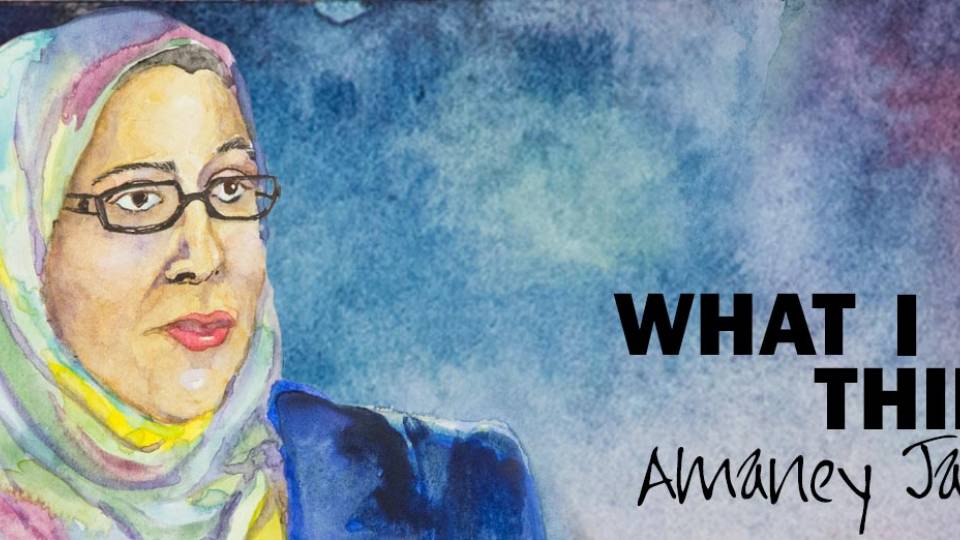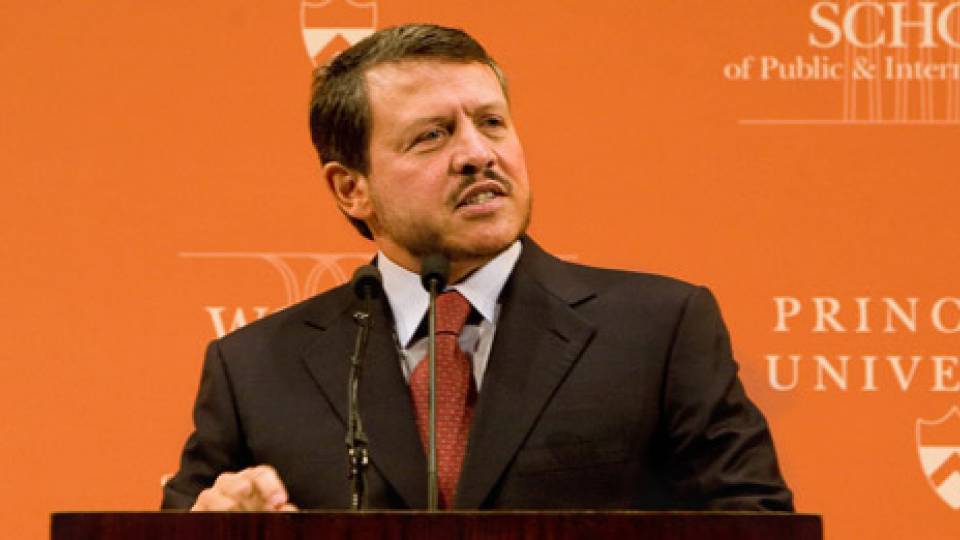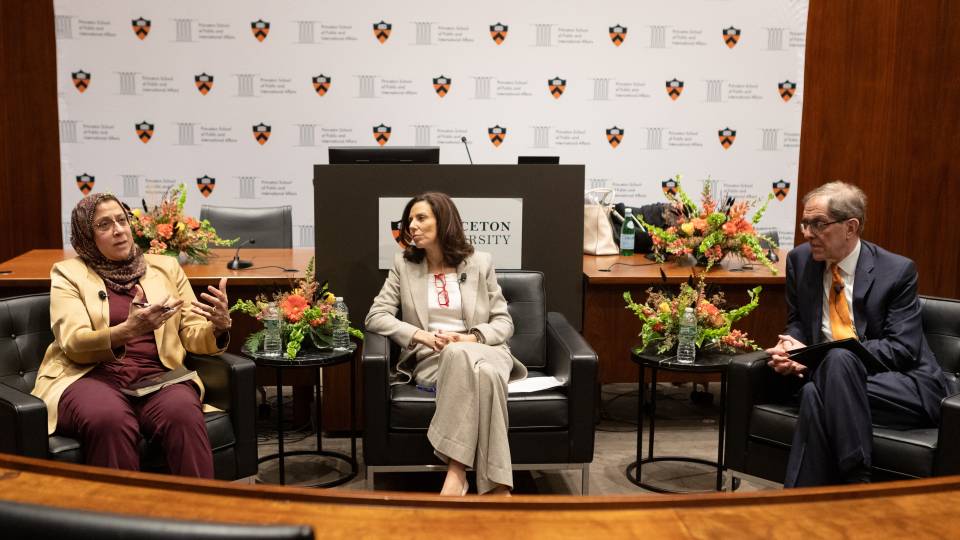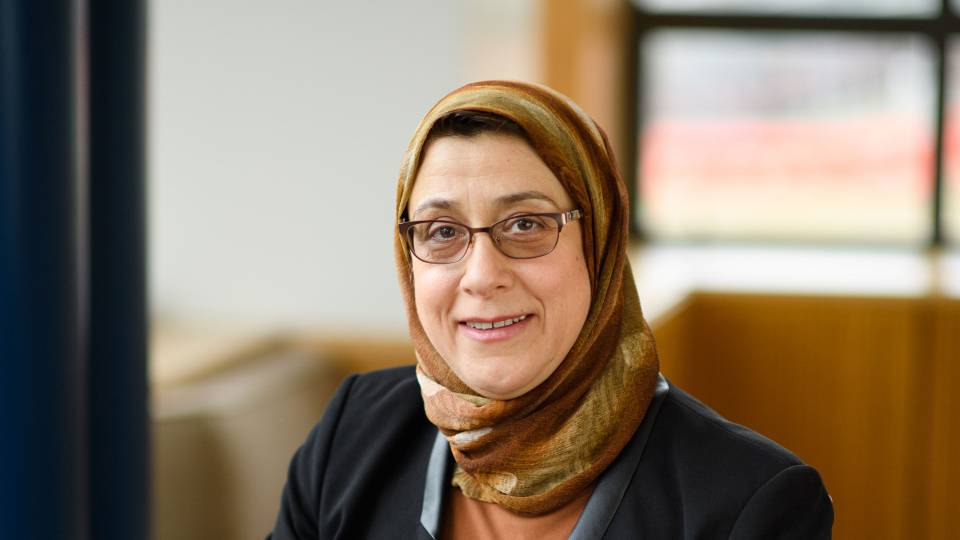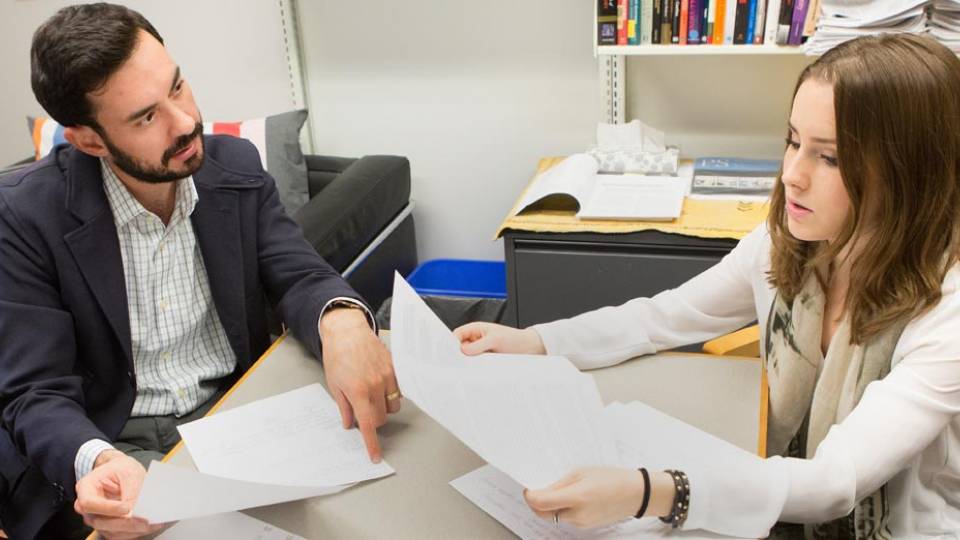From the Nov. 21, 2005, Princeton Weekly Bulletin
In studying political development both in the Middle East and among Arab Americans, Princeton political scientist Amaney Jamal examines key issues through the eyes of ordinary citizens.
Jamal, an assistant professor of politics, has traveled to the Middle East to talk directly with citizens about their own political engagement and their views on Islam to develop a more intimate understanding of the prospects for democracy in the region. She also has conducted substantial research inside Arab and Muslim communities in the United States to gain insights into their political future in the wake of the Sept. 11, 2001, terrorist attacks.
Jamal’s personalized approach distinguishes her research in areas that are in increasing demand among scholars, students and the general public. Since joining the Princeton faculty in 2003, she also has won praise for skillfully guiding students through classroom discussions on topics that can often lead to overheated debate, and has emerged as a voice for Muslim perspectives both on campus and beyond.
“She uses her training to bring us all sorts of fascinating information for communities that are understudied in a systematic way — and often misunderstood as a result,” said Nancy Bermeo, a professor of politics. “The wonderful thing about her work is that she brings us insights on people who are too often the subject of speculation and not often the subject of solid research.”
Last year, Jamal traveled to Palestine to conduct research for a book on the role that civic associations play in promoting democracy in the Middle East. The book, titled “Democratic Citizens in Non-Democratic Nations: Civic and Associational Life in the Middle East,” examines whether sports clubs, charitable organizations, women’s groups and other civic organizations “generate levels of social capital, trust, political knowledge and community participation in ways that bode well for democratic citizenship,” according to Jamal. It is expected to be published in the winter of 2007.
For her latest project, Jamal traveled to Jordan this summer and will journey to Kuwait this winter to speak directly with citizens about how governments affect their daily lives, whether they feel compelled to seek changes in their countries’ political systems and whether Islam and democracy are compatible. She received support for the project from the Carnegie Corporation of New York as part of its efforts to support “intellectual risk-takers who will play a leading role” in studying Islam and the modern world.
“I try to ask questions that are relevant not only to the academic community and to the democratization discourse, but also relevant to policy,” Jamal said. “I try to create better understanding about the ways in which the U.S. can make a difference and the ways we study the region.”
In her studies of the Middle East, a common theme Jamal explores is that high levels of unemployment and lack of higher education leave many citizens feeling disenfranchised and hinder prospects for popular support of democratic reforms in the region.
“If citizens don’t have strong linkages to their political institutions or are completely disoriented and disenchanted with the existing political processes, we’re not going to see a bottom-up democracy emerge in these regions,” she said. “There has to be a sense of political representation, an expectation of what democracy can give these citizens and an expectation that they can pressure existing regimes. But if it’s reached a point where people are so disenchanted with politics, they’re not even going to bother to affect the process in those ways.”
Interest born of experience
Jamal’s interest in both the Middle East and Arab-American issues reflects her own background. A daughter of Palestinian immigrants, she was born in the San Francisco Bay area and also lived in central and southern California until the age of 10, when her father moved their family back to Palestine.
“During the ’60s and ’70s, it was more about assimilation — if we can get good jobs, work really hard, then we can accomplish the American dream. The immigrant discourse in America wasn’t about multiculturalism and taking pride in your own identity,” she said. “As a child I didn’t speak any Arabic and I didn’t know anything about my religion. My father woke up one day and it really hit him: He was successful on the economic side of the story, but he said, ‘My kids don’t know anything about their own heritage.’”
As a high school student during the 1980s, when the Palestinian-Israeli conflict intensified, Jamal realized she wanted to study political science. She graduated from the University of California-Los Angeles in 1993 and earned her Ph.D. in 2002 from the University of Michigan’s political science department, which is renowned for its strength in public opinion research.
While at Michigan, Jamal joined colleagues in a study of the large Arab-American community in the Detroit area following the Sept. 11, 2001, attacks. Amid escalating fears that members of the Arab-American community were a threat to national security, the researchers explored the political and social lives of those community members and their struggles with issues of identity and assimilation. The researchers hope to complete a book on the subject by the end of this academic year.
“I began studying the Arab and Muslim community when it wasn’t really fashionable, in the late 1990s,” said Jamal, who also has conducted research on the political engagement of Muslims in New York City. “As a daughter of immigrants, I wanted to learn more about the conditions under which immigrants generally began to see themselves as U.S. citizens and how they build political efficacy as a community and form a local identity in certain communities.”
“Amaney brings more than one arrow in her quiver for us,” said Christopher Achen, associate chair of Princeton’s politics department. “Among those are the strong Michigan training in quantitative methods and survey research and her experience with the Muslim community in the U.S., which is of growing importance around the world. She gives us a special access to that population. The work that she’s done in conjunction with other scholars elsewhere in studying that community is going to be the newest and most comprehensive work of its kind.”
Achen stressed the importance of Jamal’s expertise to the politics department. “We’re a department that strives to be the best in the country in everything we can manage, so it’s crucial for us to have someone with strengths in not just the Middle East but also the Muslim community in the U.S.,” he said.
Bermeo noted that one of her own senior thesis advisees is integrating Jamal’s work on Arab Americans into his research on the political assimilation of Mexican Americans. “She is a great asset to a very broad sector of our community here at Princeton,” Bermeo said.
Promoting understanding
Through her research, Jamal has been invited to participate in many panel discussions and other public talks about Middle East issues on Princeton’s campus and at other universities. She also is active with numerous public service projects related to democracy and the Arab world.
In 2004 she was named as a five-year term member on the Council of Foreign Relations and has been involved in events focused on Iraq, the Arab-Israeli conflict and Middle East development issues. She recently was appointed to an advisory committee of the council that deals with ways to counter anti-Americanism in Arab countries. She also is a member of the U.S.-Muslim relations advisory committee of the United States Institute of Peace.
Among other endeavors, Jamal frequently conducts workshops for FBI officials on cultural sensitivity, which she said has drawn criticism from some who see the activity as supporting government monitoring of the Arab-American community. “It’s sad to think about it this way, but the way I see it is the FBI is interrogating the Muslim community, so they might as well know how the Muslim community feels about it,” she said.
Dealing with controversial topics in an even-handed fashion is one of Jamal’s strengths, said Asli Bali, a graduate student in politics who served as a teaching assistant for Jamal last fall in her course, “Politics of the Middle East.”
“One thing that can be a challenge in teaching the Middle East is to offer a balanced, objective, academic account of the region without getting sucked into the very heated, very passionate debates about particular issues in the region,” Bali said. “Teaching this class at a time when the U.S. is heavily committed in Iraq, a time during which the Israeli-Palestinian peace process was in an unstable moment, these kinds of passionate opinions can sometimes lead to difficult, tense classroom situations. She was fantastic at diffusing that and making sure that we were focused on the political themes, the broader questions about the political systems of the region.
“She asked people of all spectrums of opinion to defend their opinions as strongly as they could, but ensured that they were using evidence from our readings and coursework to substantiate their positions rather than editorializing,” Bali said.
Lili Ben Shitrit, a senior majoring in Near Eastern studies, took two courses with Jamal alongside students from politics, the Woodrow Wilson School, anthropology and other areas of concentration. She commended Jamal for encouraging students to bring their “unique academic and personal perspective in discussing current debates,” and creating “an atmosphere in which ‘hot’ and controversial topics — such as the Israeli-Palestinian conflict, the U.S. role in Iraq, gender in Islam, and authoritarianism and democratization in the Arab world, to name a few — could be discussed in an extremely respectful, open and stimulating manner.”
Jamal said students can come to class “with sometimes rigid ideas about what the Arab world is all about,” and she works hard to dispel misperceptions about the Middle East and its people.
“People want to learn about the Middle East because they want to understand terrorism and why we have suicide bombers in the world. When you explain that there are 250 million people in the region and over 90 percent don’t support terrorism, it really is an eye-opener,” Jamal said.
“You will not be able to understand the people of the region, why the region is what it is today, without understanding some of the history,” she said. “Trying to break down the stereotypes is a consistent challenge in the classroom. I try to do it in a way that engages the students in a meaningful and constructive discussion.”
